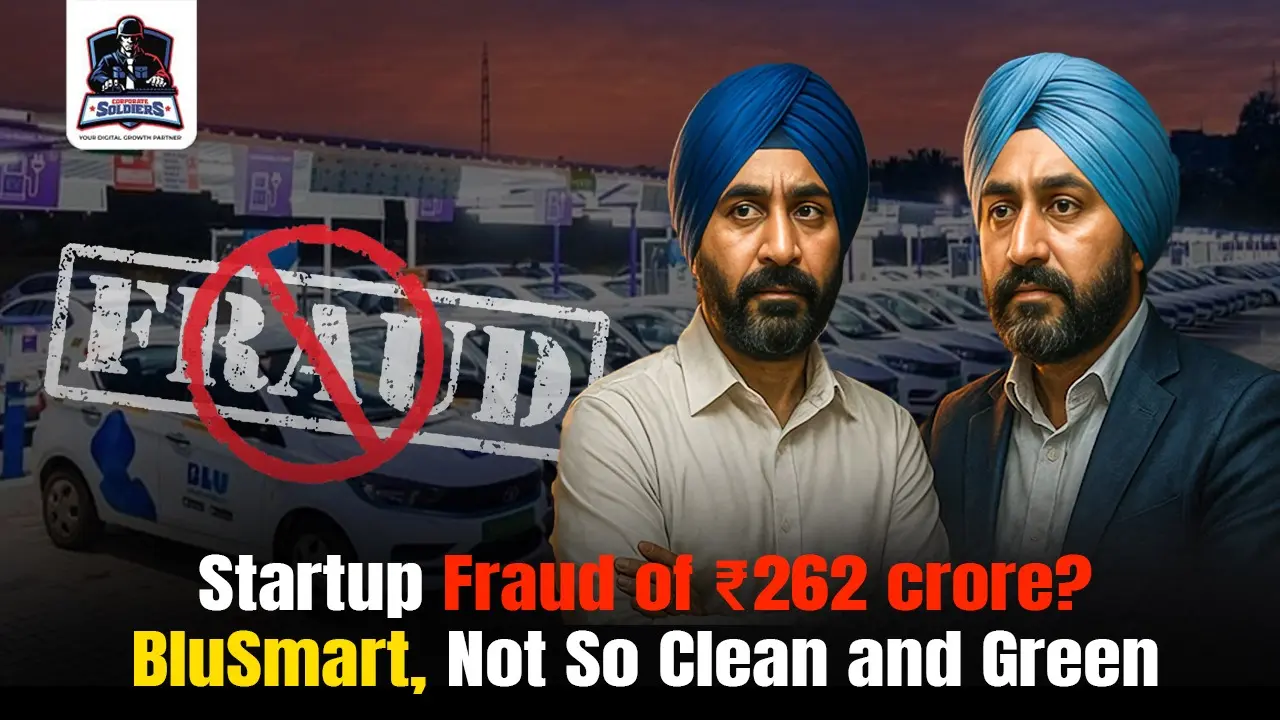India has become a real magnet for startups, hasn’t it? As the government has been fuelling this budding movement with the ‘Startup India’ initiative, the startups in India are growing like mushrooms. Even Prime Minister Narendra Modi supported this by saying, ‘Indians now are dreaming of becoming job creators rather than job seekers.’ Of course, in a country like India, where finding work can be a huge struggle, the startup movement is something really commendable.
No doubt, startups are shaking things up and giving people a real shot and we all have been rooting for this new wave, watching it take off. But lately, the news has been a bit of a downer, hasn’t it? Now, since we have mentioned it, recall the fall of Byju’s and GoMechanic. Yes, a new wave of scandal emerged soon after the high-profile collapses of Byju’s and GoMechanic. The latest cautionary tale comes from BluSmart and its parent, Gensol Engineering. The companies built on the promise of clean mobility, are now under scrutiny. But turns out that the things are not as clean as they appear. Allegations of fund diversion, lavish spending such as high-end properties and alleged corporate deceit are casting a shadow on their ‘sustainable and clean’ image.
Corporate Soldiers, along with all the people of India is wondering, ‘Is this the new face of startup fraud, where ‘saving the planet’ is the facade?
What Did Go Wrong?
So, how did this green and clean dream take a U-turn? Let’s start from where it all began! As the world is now concerned with promoting green and clean energy forms, many saw this trend as an opportunity to grow. Anmol and Puneet Jaggi, these two brothers, the founders of Gensol Engineering saw the opportunity to ride the green wave as well.
They wanted to play big and they came out with ambitious plans such as having a massive fleet of 6,400 electric vehicles (EVs) to be leased to BluSmart. That’s how BluSmart was born. To fund this, Gensol secured nearly ₹978 crore in loans from state-backed lenders IREDA and PFC between 2021 and 2024. Their pitch was clear. India’s cities would get cleaner, and investors would gain the benefits because of ongoing EV advancements.
But here, reality diverged sharply from the pitch. By February 2025, only 4,704 EVs had been purchased for ₹567.73 crore. That’s right! The purchase was far short of what they promised and well below the funds raised. The gap? Over ₹262 crore remains unaccounted for, even a year after the last segment of financing. SEBI, the market regulator of India has now started monitoring the funds.
| Category | Amount (in crore) | Details |
| Total Loans Raised | 977.75 | Loans from IREDA & PFC (2021-2024) |
| Amount Allocated For EVs | 663.89 | For the purchase of 6,400 EVs |
| Actual Amount Spent on EVs | 567.73 | Bought only 4,704 EVs |
| Unaccounted Funds | 262 | Still under investigation, remains unexplained |
So, Where Did The Money Go?
Those who often glue to TV screens to watch detective series, this is a real-life thriller for you. As SEBI is still investigating this whole fraud and peeling the layers of transactions, it actually seems like the kind that would make a Bollywood screenwriter jealous. They’ve been digging deep, uncovering layers of transactions that are jaw-dropping. Here, is what we have found so far, let’s see how these EV Loans were used in funding the luxury lifestyles of the Jaggi brothers!
₹43 crore Gone into Luxury Real Estate:
Out of ₹262 crore, at least ₹43 crore ended up buying an elite apartment in DLF Camellias in Gurugram. Yes, the luxury real estate. But here’s the kicker, the apartment was originally booked in the name of the Jaggi brothers’ mom. Later, it was transferred to a firm controlled by the Jaggi brothers.
A Lot into Personal Extravaganza:
No EVs but personal indulgences never seem to be ended. Yes, readers, funds meant for EVs were used for golf sets worth ₹26 lakh, jewellery, interior decoration, and even their credit card bills. Also, family members, relatives and related entities even received direct payouts, with little pretense of business purpose.
Stock Price Manipulation:
Wait, because there is more to this list. It appears they have been playing games with the stock market. It seems Wellray Solar, another company with ties to the promoters, was used to manipulate Gensol’s stock. The alleged goal? To create fake demand and artificially inflate the company’s value.
Fake Documents & Credit Rating Deceit:
Just like many frauds, the last on their scam list comes the ‘fake documents and credit rating deceit’. To hide certain loan defaults, Gensol submitted forged ‘no default’ letters to credit rating agencies. This misled both, lenders and investors about the company’s actual financial status.
Why Are Startups Taking Such Routes?
Everyone dreams of being successful in terms of money. They dream of hitting the jackpot of making it big and fast. But sometimes, that hunger for quick riches can lead to some seriously bad decisions. Just look at the recent startup scandals they indicate how chasing money too hard can backfire big time. Startups are just like this. Here, founders are constantly hustling to show crazy growth, secure some good funding, and hit those insane goals that investors set. India is a tough market where competition is fierce, hence, the pressure on such startups just skyrockets. If the founders don’t see a clear path to a profitable exit, some might start taking shortcuts or, worse, flat-out cheating to make things look better. This keeps the investors happy, or just stays afloat long enough to get another round of funding.
- Now, here’s the thing. A lot of these young startups don’t have the safety nets in place. They don’t have clear rules, separate responsibilities, or formal processes. Since they have small teams and little oversight, one key person might be handling everything such as finances, operations, and reporting. This makes it easy to fudge numbers or siphon funds undetected. Also, private companies aren’t under as much scrutiny, it is even easier to get away with it.
- Many founders convince themselves that bending the rules is just a temporary thing. They think if they can just buy some time with a little creative accounting, things will eventually work out. Even some rationalize it as protecting jobs, securing funding, or just keeping up.
- Also, people are going with the trend, such as ‘fake it till you make it’. This mentality in the startup world, which is actually toxic, has become too evident. When founders start overpromising and underdelivering, it can quickly turn into outright deception. Plus, in some places, the rules aren’t really enforced, so founders might think they can get away with fraud without any real consequences.
Similar Financial Startup Scandales:
| Startup | Scandal | Impact | Action | Current Status |
| Byju’s | $533 Million of $1.2 Billion loan to a Miami hedge fund, Missed payments, Audits delayed | Investor losses, Bankruptcy filed in U.S. | Lawsuits from investors, U.S. bankruptcy court oversight | Restructuring via asset sales |
| GoMechanic | Inflated revenue figures to attract investors | 70% staff layoff, Withdrawal of investors | Founders sidelined, Forensic audit ordered by investors | Still operational though scaled down, Seeking partnerships |
| BluSmart | ₹262 crore diverted from EV loans to luxury flats, stock manipulation and jewellery | Gensol’s stock crashed up to 80%, BluSmart services suspended | SEBI barred founders from market, forensic audit | Gensol under investigation |
Till ‘Corporate Soldiers’ is writing this report, the company’s future seems to be in limbo. Whether it was the case of Byju’s, GoMechanic or the recent case of BluSmart, it is clarified that founders used the trust of investors and the allure of a ‘transformative’ sector, only to betray that trust for their personal gain. And the promise of clean and green? Ah, all deceit, readers!










